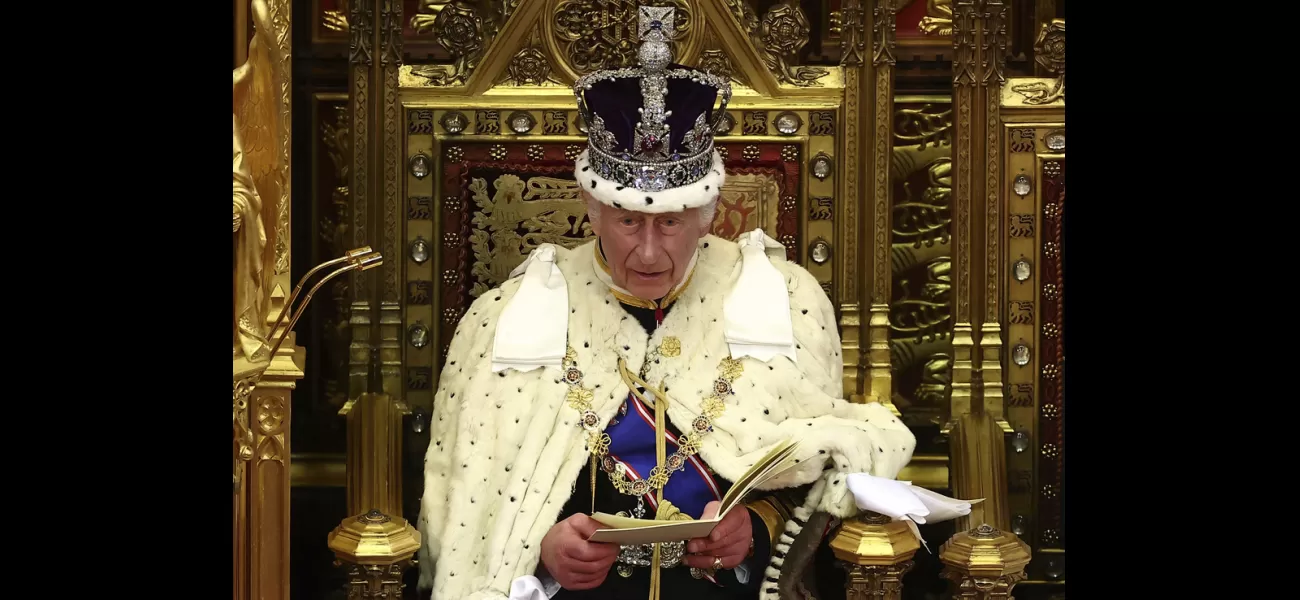Britain's Labour party unveils agenda in typical British fashion
King combined extravagance & power, wearing jeweled crown & sitting on gold throne in a mix of regal grandeur & tough politics. #royalpolitics
July 17th 2024.

The new Labour Party government in Britain has made a promise to bring some much-needed calm to the country's political climate and address the issue of rising living costs. This was made clear during the grand State Opening of Parliament, where Prime Minister Keir Starmer's legislative agenda was announced by King Charles III on Wednesday. In his speech, the king emphasized the importance of stabilizing the public finances and promoting economic growth, with the aim of creating wealth for all communities.
Starmer, who took over as Labour leader in 2020, has shifted the party's focus towards the center and campaigned on a platform of bold change that would not burden taxpayers. He aims to strike a balance between the interests of workers and businesses, while also prioritizing environmental protection. However, there is a risk that this approach may not please everyone.
In a written introduction to the speech, Starmer urged patience, emphasizing that real change requires hard work and serious solutions, rather than quick fixes and populist rhetoric. The State Opening of Parliament is a unique occasion where royal traditions meet the realities of politics. As the king donned his diamond-studded crown and sat on his gilded throne, he announced the laws that his government plans to pass in the coming year.
Labour's victory in the election on July 4 was a landslide, as voters expressed their dissatisfaction with the previous Conservative government's handling of high inflation, ethics scandals, and frequent changes in leadership. Starmer has promised to improve the country's aging infrastructure and public services, without raising personal taxes and while adhering to strict fiscal rules.
However, he also believes in an active role for the government in public life. The speech included 40 bills, double the number from the previous Conservative government's speech, covering a wide range of issues such as housing, nationalizing railways, and transitioning to green energy through a publicly owned company called Great British Energy.
The government has also promised to prioritize building and infrastructure projects, establishing a National Wealth Fund, and making changes to planning regulations to facilitate construction. Economic measures include tighter regulations for corporations and independent scrutiny of government budgets to avoid the chaos caused by uncosted tax cuts in the past.
The government also plans to introduce stronger protections for workers, including a ban on certain types of employment contracts and a higher minimum wage. Renters will also have more rights, including protection against shoddy housing and sudden eviction, as well as the ability to keep pets in their rented homes.
The government has also promised to give more power to local governments and improve public transportation, which is crucial for reducing the economic divide between London and other regions in the country. While Labour has not proposed large-scale nationalization of industries, they plan to take control of the struggling train operators.
Trade unions and business groups have given a cautious welcome to the government's economic plans. The leader of the GMB union called the speech a "breath of fresh air," while the chief executive of the Confederation of British Industry praised it for setting out bold measures to boost the economy.
The speech also acknowledged the urgency of the global climate crisis and promised to increase renewable energy while imposing stricter penalties on water companies that pollute the environment. In addition, new measures to enhance border security, including a specialized Border Security Command with counter-terrorism powers, were announced.
The king's journey from Buckingham Palace to Parliament in a horse-drawn carriage was met with a small group of anti-monarchy protesters, but the ceremony proceeded as planned. The government has confirmed its commitment to reset its relationship with European partners following Brexit and maintain strong support for Ukraine.
Despite the royal pomp and ceremony, the King's Speech is essentially a government document written by officials, with the monarch serving as a mere messenger. As Jill Rutter, a senior research fellow at the Institute for Government, pointed out, the king has no say in its contents.
Starmer, who took over as Labour leader in 2020, has shifted the party's focus towards the center and campaigned on a platform of bold change that would not burden taxpayers. He aims to strike a balance between the interests of workers and businesses, while also prioritizing environmental protection. However, there is a risk that this approach may not please everyone.
In a written introduction to the speech, Starmer urged patience, emphasizing that real change requires hard work and serious solutions, rather than quick fixes and populist rhetoric. The State Opening of Parliament is a unique occasion where royal traditions meet the realities of politics. As the king donned his diamond-studded crown and sat on his gilded throne, he announced the laws that his government plans to pass in the coming year.
Labour's victory in the election on July 4 was a landslide, as voters expressed their dissatisfaction with the previous Conservative government's handling of high inflation, ethics scandals, and frequent changes in leadership. Starmer has promised to improve the country's aging infrastructure and public services, without raising personal taxes and while adhering to strict fiscal rules.
However, he also believes in an active role for the government in public life. The speech included 40 bills, double the number from the previous Conservative government's speech, covering a wide range of issues such as housing, nationalizing railways, and transitioning to green energy through a publicly owned company called Great British Energy.
The government has also promised to prioritize building and infrastructure projects, establishing a National Wealth Fund, and making changes to planning regulations to facilitate construction. Economic measures include tighter regulations for corporations and independent scrutiny of government budgets to avoid the chaos caused by uncosted tax cuts in the past.
The government also plans to introduce stronger protections for workers, including a ban on certain types of employment contracts and a higher minimum wage. Renters will also have more rights, including protection against shoddy housing and sudden eviction, as well as the ability to keep pets in their rented homes.
The government has also promised to give more power to local governments and improve public transportation, which is crucial for reducing the economic divide between London and other regions in the country. While Labour has not proposed large-scale nationalization of industries, they plan to take control of the struggling train operators.
Trade unions and business groups have given a cautious welcome to the government's economic plans. The leader of the GMB union called the speech a "breath of fresh air," while the chief executive of the Confederation of British Industry praised it for setting out bold measures to boost the economy.
The speech also acknowledged the urgency of the global climate crisis and promised to increase renewable energy while imposing stricter penalties on water companies that pollute the environment. In addition, new measures to enhance border security, including a specialized Border Security Command with counter-terrorism powers, were announced.
The king's journey from Buckingham Palace to Parliament in a horse-drawn carriage was met with a small group of anti-monarchy protesters, but the ceremony proceeded as planned. The government has confirmed its commitment to reset its relationship with European partners following Brexit and maintain strong support for Ukraine.
Despite the royal pomp and ceremony, the King's Speech is essentially a government document written by officials, with the monarch serving as a mere messenger. As Jill Rutter, a senior research fellow at the Institute for Government, pointed out, the king has no say in its contents.
[This article has been trending online recently and has been generated with AI. Your feed is customized.]
[Generative AI is experimental.]
0
0
Submit Comment




